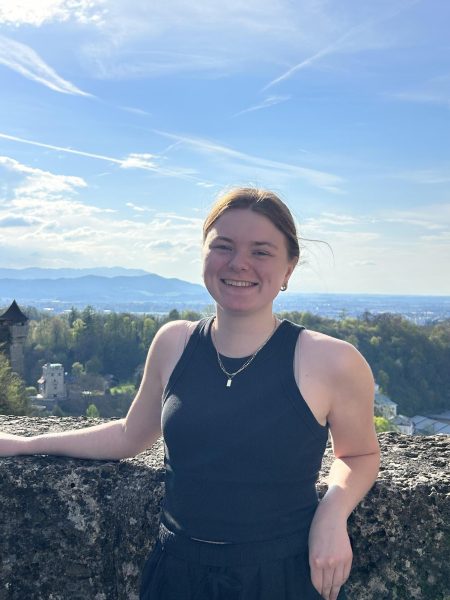Gürsel delivers McCurdy Lecture on Portraits of Unbelonging

September 29, 2022
Last Friday, students and staff gathered in the John B. Davis Lecture Hall for the 7th annual David W. McCurdy Distinguished Anthropology Lecture by Dr. Zeynep Devrim Gürsel. Gürsel presented her lecture Portraits of Unbelonging: Photography, Nationality, Mobility about the forced expatriation of Armenians in the early 20th-century Ottoman Empire as told through state-mandated photographs.
Scott Legge, chair of the anthropology department, introduced Gürsel as a “prolific author and filmmaker.”
Gürsel is a former Macalester professor of international studies and is currently an associate professor of anthropology at Rutgers University. Her lecture was crafted and inspired by her time at Macalester and honed by her research in Turkey. She thanked the librarians, students and staff that directly contributed to her project. “Portraits of Unbelonging is very much a Macalester community project because it developed in deep collaboration and conversation with so many individuals on this campus,” Gürsel said.
Gürsel’s lecture was based on photographs she found of Armenian families from the late 20th to early 21st century that were taken for the purpose of leaving the Ottoman Empire on the condition that they would never return. The photographs were used to police their movements and ensure they could not re-enter the state.
“These were bureaucratic images, images taken for state officials,” Gürsel said. “On the back of the photographs they were described as photographs taken for purposes of tagging people for immigration.” Gürsel explained how she became obsessed with these state images of families and had to learn more about the people in these photographs.
She emphasized that her term “family portraits” is misleading, as they were not photographs commissioned by the families but rather photos taken of families for documentary purposes of the Ottoman Empire. They showed their “unbelonging.”
“Through these portraits of belonging, I learned that one of the things that photographs can take away or give back is a nationality, that each portrait captures unbelonging, not belonging,” Gürsel said. “They function opposite to how passport photographs work. They don’t confirm some nationality but confirm the loss of nationality.”
The presentation was framed through the concept of “looking together” at photographs and examining different stages of Armenians’ family portraits through bureaucratic time, familial time and artistic time.
“Although no photographs freeze a single moment, looking together requires looking at them from the perspective of many different points in time to search not only what they show, but what they cannot yet show or what they can no longer show,” Gürsel said.
Gürsel focused most of the presentation on a case study of the Coralian family who she followed through their immigration to the United States and through generations up to Ron Coralian.
For the project, Gürsel spent a lot of time with Ron Coralian, a second generation American and son of Harry Coralian from the expatriation picture. Ron Coralian was against helping with the project at first, claiming that he had no family portraits of his father and did not associate with his Armenian identity.
Despite his initial refusal, Ron Coralian proved to be invaluable and showed Gürsel hundreds of family portraits. He even pulled out the same photo Gürsel had been obsessing over: their expatriation photo. He also showed another photo, one that was of the family but looked like it had been commissioned. Gürsel defined his portrait as a true family portrait, one that showed the family’s relationships and was taken for their purpose rather than that of the state.
Gürsel added a coda to her presentation and talked about how it was also inspired by her time at Macalester.
“The beauty of teaching is, [your students] leave and their voices stay with you … I knew that if I end here, I would have several Macalester students saying ‘but you make it seem as if the family came to America, and then things were smooth sailing and as if immigrants simply had a mythical happy American life and encounter no difficulties. Is that really what the empirical research shows?’ So this coda is because I hear those voices,” Gürsel said.
The coda focused on an exploration of a family that did not “assimilate” well into America – the Cartozian family.
The Cartozian family came to the United States in 1906 from the expatriation process in the Ottoman Empire. They created a very successful carpet business in Portland, Oregon. However, when Tatos Cartozian, one of the brothers, wanted to naturalize, he was rejected and a court case ensued where the Cartozians had to prove they were not “Asian” and rather “white enough” to be eligible for American citizenship.
Gürsel’s article and coda also discuss how the definition of “white” changed in America rapidly due to new immigration and how the Cartozians were caught in America’s racist endeavor to exclude people of color from citizenship. Gürsel said that “belonging” was not secure in the United States either.
Gürsel ended her presentation with a call for histories and ethnographies such as hers to be more widely explored.
“I will end by suggesting that we are in need of far more inclusive histories of exclusion,” Gürsel said.













